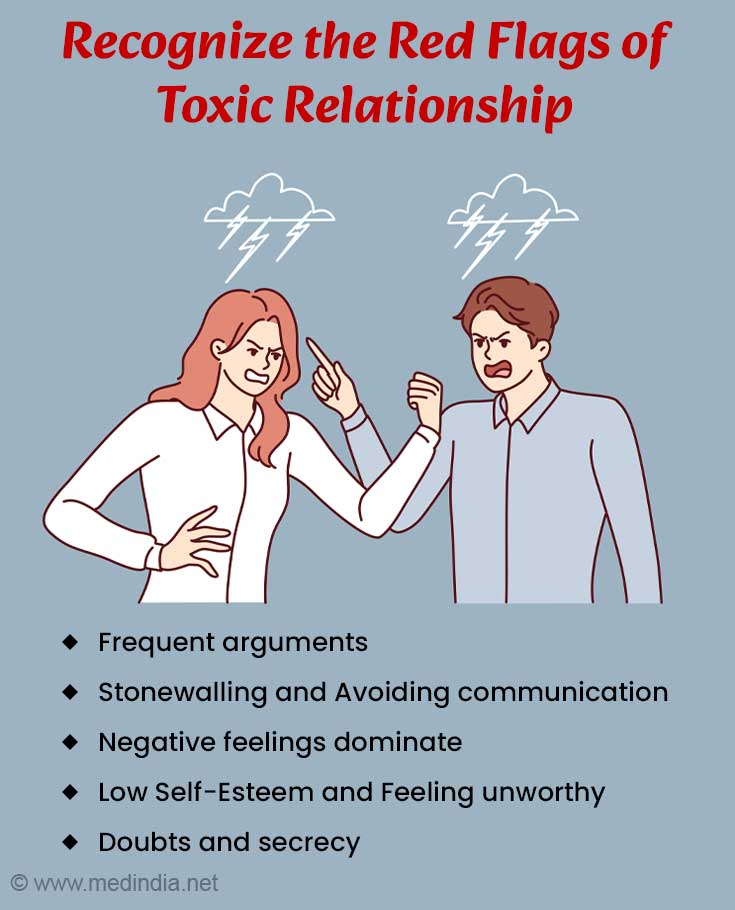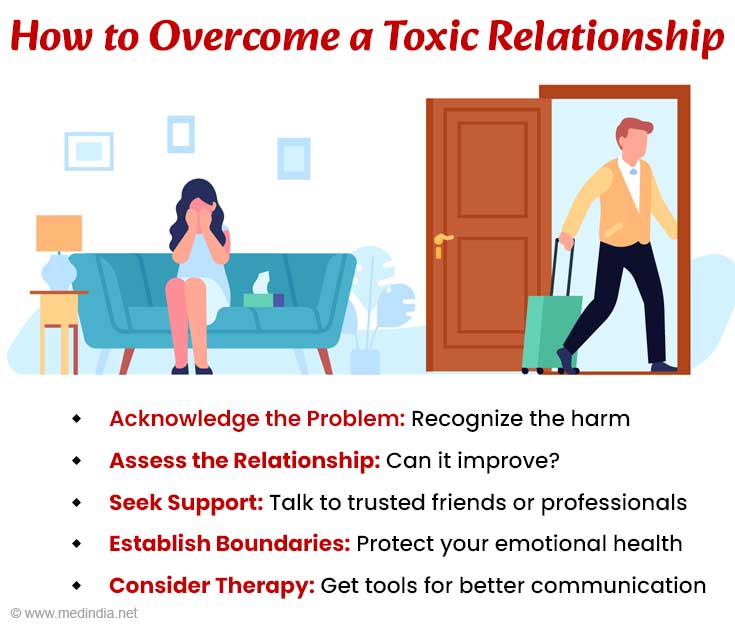- Toxic Relationships: The Experiences and Effects of Psychopathy in Romantic Relationships - (https://pmc.ncbi.nlm.nih.gov/articles/PMC9527357/)
About
Disagreements are a natural part of any relationship. However, the way these conflicts are handled can make a significant difference. A healthy relationship allows for open communication where both individuals feel heard and respected. On the other hand, when conflicts become frequent and unresolved, the relationship may become toxic.
A toxic relationship is not limited to romantic partnerships—it can occur in friendships, family connections, and workplace interactions. Identifying the warning signs early can help prevent emotional distress and long-term negative effects(1✔ ✔Trusted Source
Toxic Relationships: The Experiences and Effects of Psychopathy in Romantic Relationships
Go to source).
What Defines a Toxic Relationship?
According to relationship experts, a toxic relationship negatively impacts your emotional, physical, or psychological well-being. This often stems from poor communication patterns and unresolved conflicts. While every relationship has challenging moments, toxic relationships are characterized by ongoing harmful behaviors that hinder the well-being of those involved.
It is also important to differentiate between toxic and abusive relationships. While toxic relationships can involve unhealthy communication and emotional distress, abusive relationships typically involve manipulation, control, and intentional harm.
Warning Signs of a Toxic Relationship
Toxic relationships manifest in different ways, but there are some common red flags that indicate unhealthy dynamics:
1. Constant Negative Interactions
If interactions with your partner, friend, or colleague consistently lead to arguments or distress, it may signal toxicity. A healthy relationship should foster comfort and security rather than make you feel like you are constantly walking on eggshells.
2. Stonewalling
Stonewalling occurs when one person refuses to communicate, avoiding discussions or shutting down conversations altogether. This behavior prevents conflicts from being resolved and creates emotional distance between individuals.
3. Growing Resentment
When negative emotions overshadow positive ones, it can lead to resentment. This may stem from unmet expectations, lack of support, or repeated hurtful behaviors. If left unaddressed, resentment can erode the foundation of any relationship.

4. Declining Self-Esteem
If someone in your life consistently makes you feel unworthy or guilty, this is a major red flag. A toxic relationship often involves criticism, belittling, or actions that make you question your self-worth.
5. Lack of Trust
Trust is essential in any relationship. When there are constant doubts, secrecy, or feelings of betrayal, the relationship can become unstable. Whether it involves small lies or major breaches of trust, unresolved dishonesty can be a sign of toxicity.
6. Concern from Loved Ones
Sometimes, those closest to you can recognize toxic patterns before you do. If family or friends express concern about your relationship, take their observations seriously and reflect on the situation.
Psychological Impact of Toxic Relationships
Toxic relationships don’t just affect day-to-day interactions—they can take a serious toll on mental and emotional well-being. Constant negativity, manipulation, or emotional distress can lead to chronic stress, which, over time, may contribute to anxiety, depression, and even physical health issues such as headaches, fatigue, and digestive problems. When someone is constantly exposed to criticism, this can lead to self-doubt and a deep-seated fear of expressing one’s own needs and desires.
Additionally, toxic relationships can disrupt an individual’s ability to trust others. Repeated experiences of betrayal, gaslighting, or emotional withdrawal may cause someone to develop defense mechanisms that prevent them from forming healthy connections in the future. They might become overly guarded, hesitant to open up, or even fearful of relationships altogether. In severe cases, toxic relationships can even contribute to symptoms of post-traumatic stress disorder (PTSD).
How to Overcome a Toxic Relationship?
If you find yourself in a toxic relationship, it is important to take proactive steps to protect your well-being.

- Acknowledge the Problem – The first step is recognizing that the relationship is harmful. Denying or ignoring the issue can prolong emotional distress.
- Assess the Relationship – Determine whether the relationship can be improved or if it is better to step away. A relationship can only improve if both individuals are willing to make changes.
- Seek Support – Talk to trusted friends, family, or professionals who can offer guidance. If the relationship is abusive, consider reaching out to a support organization for assistance.
- Establish Boundaries – Setting clear boundaries can help protect your mental and emotional health. If the other person does not respect these boundaries, it may be a sign that distancing yourself is necessary.
- Consider Professional Help – Therapy or counseling can provide tools for improving communication and addressing toxic dynamics. If both parties are committed to change, professional intervention may help rebuild the relationship.
Healthy Relationship Habits to Cultivate
A strong foundation is built on open and honest communication, where both individuals feel comfortable expressing their thoughts and emotions without fear of judgment. Active listening plays a key role in this process—when both people genuinely listen to each other’s concerns rather than reacting defensively, conflicts can be resolved more effectively. Transparency, trust, and consistent support create a sense of security that allows relationships to thrive.
Another crucial aspect of a healthy relationship is setting and respecting boundaries. Every individual has their own emotional and personal limits, and acknowledging these boundaries fosters mutual respect. Relationships should be a source of support, not restriction. By practicing empathy, resolving conflicts constructively, and prioritizing emotional well-being, individuals can cultivate relationships that are nurturing, respectful, and emotionally rewarding.
Conclusion
Leaving or fixing a toxic relationship can be challenging, but prioritizing your well-being is essential. Whether it involves working on the relationship or stepping away, taking action can lead to healthier, more fulfilling connections. Recognizing the signs and seeking help when needed can make all the difference in fostering relationships that support and uplift you.








